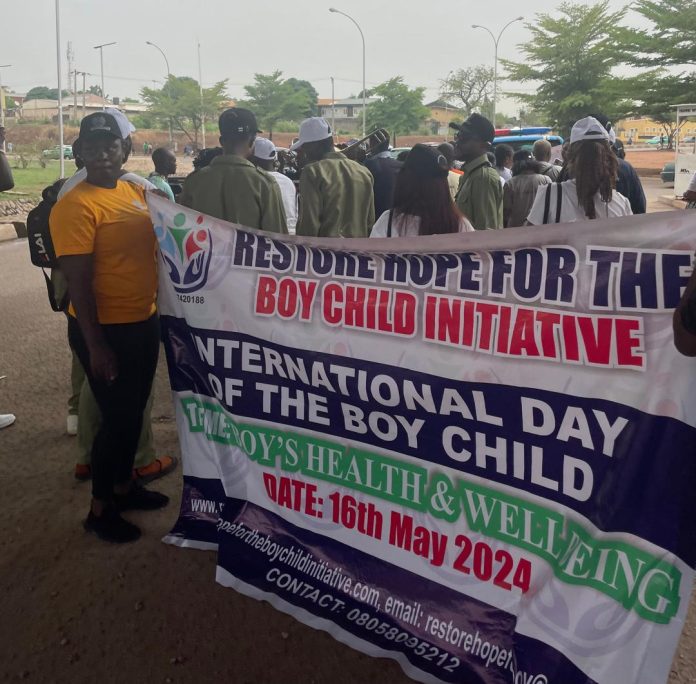A Civil Society Organization (CSO), Restore Hope To The Boy Child Initiative, has called on the Nigerian Government, parents and other stakeholders to prioritize the well-being of the boy child.
Speaking to newsmen on Thursday in Abuja, at the occasion of the International Day of the Boy Child with the theme:”Boy’s Health and Well-being”, the Executive Director of the Initiative, Dr. Babatunde Kayode, mni noted that the boy child faces numerous challenges.
Kayode urged the Nigerian Government, parents and well-meaning Nigerians to create enabling environment for the boy to thrive in terms of his health and physical development, emotional well-being, equal opportunities among others.
He said,”We gather here to shed light on an important issue that demands our attention and collective efforts—the well-being of boys.
“In line with this year’s theme of the International Day of the Boy Child which is ‘Boy’s Health and Well-being” we shall focus on their needs to feel happy, healthy, and valued within their families and communities.
“The Boy Child faces numerous challenges, and while some of these issues are not exclusive to them, we recognize the need to address them from their perspective. We will tackle key areas such as Role Models and Positive Masculinity, Health and Physical Development, Emotional Well-being, Equal Opportunities and Gender Equality, Education and Learning.
“For example, in instances of violent conflicts and insecurity, boys are particularly vulnerable. They are coerced into becoming child soldiers, subjected to torture, and even face sexual abuse. Societal expectations of male strength and emotional resilience often result in a culture of silence among male children, even in the face of danger. The suppressed pain can lead to psychological problems and trauma.”
Kayode decried the growing incidences of single parenthood which he said has created a void in mentorship and positive role models for the Boy Child.
“Furthermore, the growing incidence of single parenthood has created a void in mentorship and positive role models for the Boy Child. From a young age, boys carry the burden of being providers, shaping their choices and often diverting them from pursuing their passions to meet financial expectations from family and society.
“Consequently, we witness a rise in toxic masculinity, mental and physical challenges, ritual killings, internet fraud, a surge in violent conflicts, an alarming rate of school dropouts and drug abuse among the boys. Teachers have observed low attention spans and declining educational performance among primary and secondary school-aged boys. Addressing these issues requires the collective efforts of parents, schools, society, government, and private individuals to find holistic solutions,” he said.
Kayode stressed that the well-being of boys is a matter of utmost importance, as he called on parents, schools, local and international humanitarian organizations, communities, government agencies, and individuals to join in the noble cause.
“In conclusion, the well-being of boys is a matter of utmost importance, and together, we can create a future where they thrive, excel, and contribute positively to society. We call upon parents, schools, local and international humanitarian organizations, communities, government agencies, and individuals to join us in this noble cause.
“Let us restore hope to the boy child and ensure they receive the care, support, and opportunities they deserve,” he said.
Also speaking, the Spokesman of the Initiative, Hadiza Onido noted that there have been gaps in polices and attention that has relegated the boy child to the background.
She therefore called for equal treatment and attention to both the girls and the boys, adding that failure to empower the boys will endanger the future of the girls.
“The occasion of the ‘International Day of Boys’ signifies a complementary role to the attention we give to girls, this is not to say that there have been too much attention paid to the girl child. It is just that while we are pursuing that noble course there have been gaps in polices and gaps in attention. There have been a source of neglect to issues that affect the boy.
“So, what we are trying to do today is to wake up consciousness to the fact that as we take care of the girls we should also take care of the boys. And the issues that affect children is most times general and we must develop peculiar ways of looking at such issues because in a unique way the problems that affect child affect the boy child differently.
“So, the way we have tailored policies to address gap in issues or challenges that concerns the girl child, we also advocating today that such tilted views be granted to issues that concerns the boys, and the challenges that they face,”Onido said.
She added,”In the area particularly their emotion. A boy is expected to man up, a boy is expected to be a man from the first day, this has created vacuum in expression, so, the day to day things that affect them, they are not free to talk about them. They perceive it as a form of weakness if they break down, if they express the pain that affects them, and this has been the culture of silence and allowed a lot of things that would have tackled to happen to them.
“From the first day the boy wants to be a man, it is all noble and fine but we must create room for them to express themselves, for them to experience their childhood to know that it is ok for them to speak out,” she said.
Onido advised the boys to express themselves and cry out when things are not going on well them, not minding the mindset that they have been raised up with.
“The message I have for the boys today is that there is no future without them. We reckon with them, we love them and it is ok to cry out when you are not ok, when you don’t feel fine,” Onido advised.
She expressed her joy that every international and local organizations they contacted on the issues of the wellbeing of the boy child has assured of their support for the noble course.
Onido noted that they are open more collaborations, adding that they have written to international and local NGOs, and government for collaboration, and that they have received positive responses from them.




